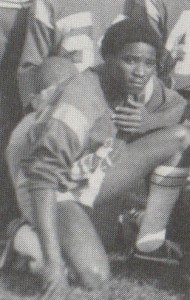Robert Copping
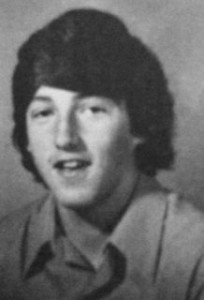 “Do and say as you please until somebody bigger says otherwise.”
“Do and say as you please until somebody bigger says otherwise.”
Destination: Motocross racer
Probable Destination: Moped mechanic
Weakness: Ski-bunnies, PE’s
Pet Peeve: Lottery winners, pinheads, 4 strokes
Favourite Expression: “Because you’re a rabbit, that’s why.”
Activities: Motocross, skiing
COPPING, Robert Newton. Accidentally in Rawdon on Saturday, March 9, 1991 in his twenty-fifth year. Dear son of Hazel Mary Coxon and Newton Copping. Beloved brother of Dawn Marie (Mrs. Michael Uniat) of Lachine. Loving grandson of Helen B Copping of Rawdon. Funeral from Christ Church, Rawdon on March 13. Cremation followed. A memorial was held at Maplewood Presbyterian Church, Chateauguay on March 15. In lieu of flowers, a donation to the charity of your choice would be appreciated.
The Montreal Gazette, March 13, 1991
Peter Noble
No yearbook entry
Peter Noble
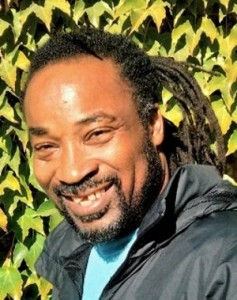 It is with great sadness that we announce the passing of Peter Anthony Noble, formerly of Kingston, Jamaica, son of Thelma Francis (deceased) and Hugh Noble on April 7th, 2018.
It is with great sadness that we announce the passing of Peter Anthony Noble, formerly of Kingston, Jamaica, son of Thelma Francis (deceased) and Hugh Noble on April 7th, 2018.
Together with his father, Peter leaves behind to mourn his sons, Nathaniel Kennedy-Noble, Nicholas Noble and Nyle Noble, his granddaughter, Kaleigha Kennedy-Noble, his godson, Malik Dauda, his siblings, Devine Murray (deceased), Dalbert (Sana) Allison, Lorna Samuel, Margaret Noble and Andrew Noble, the mother of his children, Erica Kennedy, the grandmother of his children, Arnette Morgan, his daughter-in-law, Rojarra Armbrister, his step-mother, Verne Hutchinson, his step-siblings, Marlon and Michelle Hutchinson, his aunts, uncles, nieces, nephews, cousins and many other relatives and close friends.
Darin Wilkie
“Friends are good, but sometimes they stray. I hope we never see that day.”
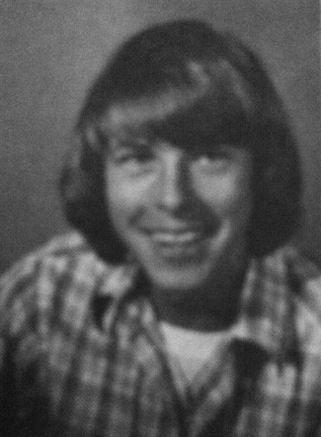
Destination: Carpenter
Probable Destination: Toothpick maker
Weakness: Nancy in tight jeans
Pet Peeve: School
Favourite Expression: “Right!”
Activities: Running, Nancy
1983 Yearbook
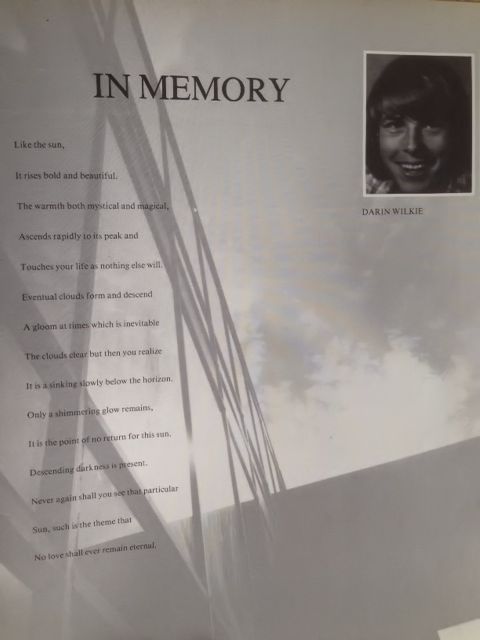
Joe Rose
“I’ve served my time, now I finally sprung.”
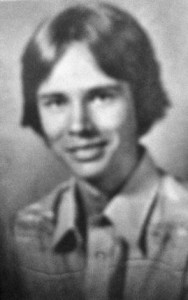
Ambition: M.D. in Armed Forces
Probable Destination: Patient on “Funny Farm”
Weakness: Older women, S.K., abandoned animals
Pet Peeve: Ugly seventh graders, recorders in halls,
F.E.: It wasn’t me!
Activities: Housework for disabled mother (Ha! Ha!), drama
Joe Rose, a 24-year-old student, was stabbed to death on March 19, 1989 by a group of teenagers who targeted him because of his pink hair. While the killing of Mr. Rose, a high-profile gay activist, is not classified as a sex slaying, it focused attention on homophobic violence.
Globe and Mail, National Edition, Monday, November 15, 1993
Prejudice to pride: The forgotten murder of Joe Rose
The Joe Rose story could have remained under the radar had it not been for the work of journalist David Shannon
BY RICHARD BURNETT, SPECIAL TO THE GAZETTE MARCH 14, 2014
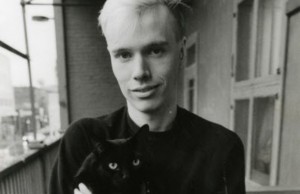
Joe Rose, who founded Dawson College’s Etcetera Club, was murdered on March 19, 1989.
MONTREAL – Joe Rose had pink hair. That’s a detail people tend to remember about the young man who was stabbed to death in Montreal in the early-morning hours of March 19, 1989.
Rose had boarded the No. 358 eastbound bus at Atwater métro and was headed to the east-end AIDS hospice where he lived when he and his friend Sylvain Dutil were taunted and attacked by a group of teenagers.
“Faggot!” the teens shouted.
As the bus approached the Frontenac métro station, Rose, who was 23 years old, was kicked, struck on the head and stabbed to death.
Dutil escaped with minor injuries. A Gazette story from the time reported that Dutil, splattered with blood from the attack, was trying in vain to resuscitate Rose when police arrived a few minutes later.
In a civil suit, Joe Rose’s parents claimed the bus driver did not activate the bus’s emergency signal. The city’s transit commission was eventually ordered to pay $25,000 in damages to Rose’s parents. “It is clear that the attack was foreseeable from the beginning and that it was imminent from the moment the two victims were not allowed to leave the bus,” Justice Rodolphe Bilodeau wrote in a 1996 judgment.
Four teenagers were eventually convicted of the grisly murder, but for Rose’s younger brother Geoffrey, the pain remains fresh.
“Joey had asked me to join him at (Montreal gay dance club) K.O.X. that night, but I told him I couldn’t go because (my band) was working a gig in Ste-Thérèse,” said Geoffrey, who was 20 years old when his brother was murdered. “The first thing I did when I learned my brother was dead was go over to my friend Don’s place and I cried in his basement. I’ll never forget that.”
The fatal bus attack took place during a turbulent era for Montreal’s LGBT (lesbian, gay, bisexual and transgender) community. Ravaged by HIV at the height of the AIDS crisis and grappling with homophobia, the community’s sense of being under siege was further complicated by anti-LGBT hate crimes and a string of unsolved murders.
The murder proved to be a turning point for Montreal’s gay community. The attack fuelled a rising anger and sparked a generation of activists to fight back during what are widely considered the crucible years of Montreal LGBT activism, from 1989 to 1994.
Twenty-five years later, Montreal is one of the world’s most gay-friendly places, and Joe Rose has been all but forgotten.
The Joe Rose story could have remained under the radar as just another hate crime had it not been for the work of journalist David Shannon, who at the time of Rose’s murder wrote the gay column Out in the City for the Montreal Mirror and hosted The Homo Show on CKUT Radio, McGill University’s campus radio station.
“The Rolodex of gay mouthpieces was not very extensive at the time, so reporter Albert Nerenberg of the Montreal Daily News tabloid contacted me,” said Shannon. “Then other news outlets began to call, too — The Gazette, CJAD, CFCF, and As It Happens from CBC Radio, which took the story national.”
While Shannon was ambivalent about becoming a spokesperson for Montreal’s gay community, Montreal activists Roger Le Clerc, Michael Hendricks, Claudine Metcalfe and the late Douglas Buckley-Couvrette — who would become Montreal’s gay brain trust in the 1990s — had no such qualms.
“Joe was murdered because he had pink hair, and David didn’t let the story go,” said Hendricks, who with his partner, René Leboeuf, won a landmark 2004 Quebec Superior Court ruling that allowed them to become the first same-sex couple to legally marry in this province. “Everybody thought gay life in Quebec was wonderful because the Quebec human rights code had been amended to ban discrimination based on sexual orientation. We had our usual Quebec superiority and didn’t believe that these things could happen in Montreal. But they did. It’s just that no one talked about it — that is, until the murder of Joe Rose.”
Although the Rose story was garnering media attention, the revolt didn’t really begin until three months after the murder, when AIDS activists took over the opening plenary session at the International AIDS Conference in Montreal in June 1989. Until Montreal, the conference was an elite members-only event for the AIDS establishment that tended to reduce AIDS patients to statistics on spreadsheets.
The New York chapter of the AIDS Coalition to Unleash Power — known as ACT UP, a group fighting for new medical research and treatment for AIDS patients — drove up by bus for the conference. Joined by other AIDS activists, the ragtag group of about 300 protesters seized the stage at the conference, denouncing the government of Prime Minister Brian Mulroney’s “inaction” on AIDS to the world press, then publishing the Montreal Manifesto, an international bill of rights for people living with AIDS.
“Montreal was very important because of what we accomplished,” ACT UP co-founder Larry Kramer said in an interview some years later.
The New York chapter of ACT UP also inspired Montrealers to establish their own chapter in January 1990.
ACT UP Montreal’s first major act was to commemorate Joe Rose. Said Hendricks: “We decided our first public demonstration should be in honour of Joe Rose, so we held a die-in at Complexe Desjardins on the first anniversary of his murder, on March 19, 1990.”
Some 40 protesters chanting, “We’re here! We’re queer! Get used to it!” simulated being dead outside the entrance to Complexe Desjardins. Activists drew police chalk outlines of the “dead bodies.”
Also founded shortly after the Montreal AIDS conference was the Montreal chapter of Queer Nation — named Queer Nation Rose to make it bilingual, but also as a nod to Joe Rose.
The militancy fostered by these groups set the tone in the wake of another dark day for Montreal’s gay community: the infamous police raid on the Sex Garage loft party the morning of July 14, 1990.
Some 400 partygoers — mostly gay men, lesbians and drag queens — filed outside when police busted the after-hours party on de la Gauchetière St. Then, 40 officers wielding billy clubs took off their name tags, got into battalion formation, and beat and herded partygoers, who began chanting “Gay Rights Now!” along de la Gauchetière toward Beaver Hall Hill, where another wall of officers stood stroking their night sticks in mock masturbation. In the end, nine partygoers were arrested and charged with everything from mischief to assaulting a police officer.
Two days later, when then-police chief Alain St-Germain failed to show up for a meeting with members of the LGBT community at the downtown police station, more than 400 protesters demanded to meet with mayor Jean Doré, locked arms and occupied the intersection of St-Mathieu and de Maisonneuve Sts.
This time, the Montreal media were out in full force, and what they saw was a violent confrontation between police officers and protesters. “One famous picture on the cover of The Gazette shows (a protester) being dragged off by her hair by a female police officer,” Hendricks said. “Bystanders were so horrified, they were screaming at the police.”
Photographer Linda-Dawn Hammond, who was one of the 48 activists arrested that day, described beatings inside the jail cells. “One girl had purple bruises down her arm and another had a boot print on her face,” Hammond told Hour magazine on the 10th anniversary of the Sex Garage raid.
For Montreal gay activists, these events were the last straw.
That night after the demo, “hundreds of people showed up at ACT UP’s regularly scheduled meeting at the (LGBT) community centre,” said Shannon. “The agenda was cleared and given over to what had happened that day.”
The meeting led to the creation of committees, demos and marches, creating a road map of activism for years to come. One of the groups founded was Lesbians and Gays Against Violence (LGV), predecessor of La Table de concertation des gaies et lesbiennes du Grand Montréal, the political-action group that was established in 1991, following a deadlocked meeting with Montreal police about a string of unsolved gay murders in the city.
The very day La Table was founded, it struck up the Comité sur la violence, comprised of Hendricks, Le Clerc, Metcalfe and Buckley-Couvrette.
“It’s clear to me that the four of us represented the gay community in Montreal during that era,” said Le Clerc, who served as director-general of COCQ-Sida from 1996 to 2002, and is currently the director of CEDA (Comité d’éducation aux adultes) in Little Burgundy. “Nothing happened in the community without people calling us for advice, or to attend their press conferences. We each had our roles: Douglas (Buckley-Couvrette, who died of AIDS in 2002) was the English spokesperson and was much more aggressive than I was. A team like ours also requires a good boy to play off the bad boy, and Michael (Hendricks) was our good boy and main strategist. No matter what action we did, our goal at minimum was we wanted page three of The Gazette and La Presse, and we achieved that most of the time.”
“Roger (Le Clerc) was the person who melded the message and strategy with the political experience that we lacked,” said Metcalfe, who served as editor of the now-defunct lesbian magazine Gazelle, and was the political attaché for Line Beauchamp when she was a provincial Liberal cabinet minister. “As the sole woman on the team, I was respected and treated as an equal at all times. We were like a hockey team, passing the puck to the each other. It didn’t matter who scored as long as we won the game.”
The committee’s biggest victory came in 1993 after Robert Bourassa’s Liberal government initially refused to hold public hearings into violence and discrimination against gays and lesbians, for which the Comité sur la violence had been lobbying since August 1992. A furious Le Clerc then mockingly invited closeted Quebec judges and politicians to join him at a big party at Olympic Stadium to celebrate “how wonderful gay life was in Montreal.”
The government changed its stance, and the Quebec Human Rights Commission’s public hearings were held in Montreal from Nov 15-22, 1993, chaired by Fo Niemi, who today is executive director of the Center for Research-Action on Race Relations.
“After his murder, I visited the apartment Joe Rose shared with another friend,” Niemi recounted. “It was very touching and sad because Rose had AIDS and was not in the best shape health-wise or financially when he died. It’s symptomatic of the kind of bias and discrimination people lived with in those days. During the public hearings, because I felt that personal connection to his death, that helped me push much harder for the recognition of hate crimes, which have always been an issue Quebecers try to avoid talking about in an honest manner.”
The week before the hearings began, closeted Anglican priest Warren Eling was killed in Montreal by a crack-addicted hustler on the night of Nov. 8, putting the murder of gays back in the news.
“Suddenly, violence became the centre of the hearings,” Hendricks said.
The Quebec Human Rights Commission published its report on the hearings, From Illegality to Equality, in May 1994. It made 41 recommendations, including on improving relations with police — which saw concrete results. The Comité sur la violence heralded a “new era of co-operation” after being given unprecedented access to police findings on the murders of 15 gay men in Montreal.
Meanwhile, La Table de concertation was key in lobbying for the 1999 passage of Quebec’s historic Omnibus Bill 32, which extended benefits, pensions and social services to same-sex couples. That led to Hendricks’s 2004 Quebec Superior Court victory legalizing same-sex marriage in Quebec. A year later, same-sex marriage was legalized in Canada.
Fundraisers in the wake of the Sex Garage raids helped raise money to cover lawyer’s fees. Criminal charges filed against the protesters — disturbing the peace, refusing to circulate and obstructing a police officer — were eventually dropped in exchange for plea bargains. Two police officers were later disciplined by the force.
In particular, LGV’s 1990 Sex Garage march and benefit concert laid the groundwork for Montreal’s Divers/Cité Gay Pride march. Sex Garage also inspired Bad Boy Club Montreal head honcho Robert Vézina to organize BBCM’s first Black & Blue circuit party in 1991.
“We thought everybody needed a breath of fresh air,” Vezina said.
Over the next decade, Divers/Cite and Black & Blue would help transform Montreal into a choice international gay-tourism destination famed for its tolerance and openness.
But in 1989, the year Joe Rose was murdered, this was all unfathomable.
At the time of his death, Rose was a nursing student and AIDS activist who wanted to start a Montreal chapter of ACT UP. While attending Dawson College in 1985, he founded the Etcetera Club, a safe space for LGBT students.
He was struggling with AIDS, recurring pneumonia and severe weight loss when he was killed.
“Being gay was a strong part of Joe’s identity — not a freakish quirk — and he wanted to be accepted for who he was,” Sonja Larsen, former editor of the Dawson College newspaper The Plant, told The Gazette two days after Rose was murdered.
“Joey meant the world to me, he was my personal hero,” said Geoffrey Rose. “My big brother was taken away and I don’t know how you’re supposed to heal when something like that happens in your life. As for forgiving the guys, I don’t know, man.”
Four teenagers were convicted of killing Rose. One 15-year-old was sentenced to three years in a youth home, another got 11 months, the 14 year-old got six months, and Patrick Moise, then 19, was convicted in adult court and sentenced to seven years in prison.
“There were many more murders of gay men after Joe Rose, but Joe became a symbol — and I was one of the first to use him so, because he was killed just because he looked like a homosexual,” Le Clerc said. “There was a sense of miserablism in the gay community back then, and we used Joe as a symbol to reclaim our rights and gave rise to a new militancy in the community.”
Metcalfe would go on to run Montreal’s anti-gaybashing support group Dire enfin la violence from 1995 to 2002, a time period during which the group estimated there were an average of two hate-motivated physical assaults against LGBT people per week in Montreal.
“Joe’s death was not in vain,” Metcalfe said. “It helped open our society to homophobia, much like (the 1998 murder of) Matthew Shepard did in America. (Rose’s) death marked the beginning of an era that changed Montreal. We’ve come a long way in the 25 years since his death.”
Still, Concordia University human sciences professor Gilbert Émond, author of the book L’Homophobie, pas dans ma cour! (Homophobia, not in my backyard!), said he believes Montrealers take the gay-friendly nature of their city for granted.
“Even today, when LGBT couples hold hands outside Montreal’s Gay Village — in places like Place Ville Marie — it’s not just audacious, it is still a political statement,” Émond said. “Homophobia is still a problem, especially in our schools, where students are not being taught about homophobia and LGBT history.”
Which is why, despite the legacy of Joe Rose, his name has been mostly forgotten.
“Our LGBT history must be institutionalized in a curriculum so that the murders of LGBT people like Joe Rose, and the work of activists like Michael Hendricks and Roger Le Clerc, are remembered,” said Niemi. “Few people recall who they were. And we should remember them.”
Back in 2012, when this reporter visited students at Dawson College’s Etcetera Club, which was founded by Joe Rose, none of the students there knew who he was. After a quick history lesson, the students in May 2013 erected a plaque at Dawson honouring Rose.
“Over the span of 25 years, the club has helped hundreds of people,” said Zynor Majeed, who was co-president of Etcetera from 2012 to 2013. “It was a home when many of us did not have a safe one to go back to. It was a comforting place in a world that too often chose hate over love. It was a family to those who lost theirs by being who they are. It saved my life, and I have faith that it will continue to do so for many more years.”
Richard Burnett writes the POP TART blog atmontrealgazette.com/poptart
© Copyright (c) The Montreal Gazette
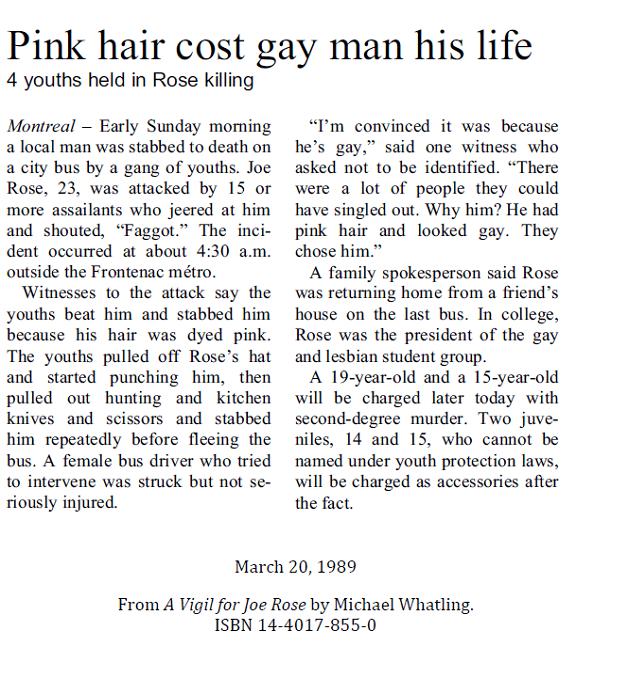
Reprinted with permission


